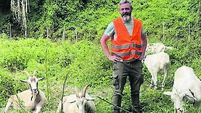Cork author's new book is inspired by devastating true story

Author Jacqueline O'Mahon. Picture: Nicola Schafer
CORK-born author, Jacqueline O’Mahony’s second novel, 'Sing, Wild Bird, Sing', is inspired by a devastating true story that happened during the Famine in the west of Ireland.
For Jacqueline, originally from Farmer’s Cross in Cork and now living in London, the tragedy “is a very good story from my point of view. I know that sounds a bit cold-hearted, but it’s a story that needs to be told and onto which you can hook a narrative”.
The tragedy happened in March, 1849, in Doolough, County Mayo, when approximately 600 starving people journeyed through terrible weather to seek help from their English landlord, but were turned away.
They walked 12 miles to the landlord’s house in Doolough, but to no avail, and had to walk back to Louisburg. Most of them died from starvation and the harsh conditions, says Jacqueline.
“It was snowing because it was unseasonably cold weather. I spoke to some local people who said there’s a very unusual microclimate in the area.
Apparently, a wind came up and just blew many of the people (including babies and the elderly) into the Black Lake. The lake has dark waters and sandy banks. Some died on its banks.
Recently, the bones from some of the victims were spotted exposed on the banks of the lake. A priest went there and did a blessing. It was decided to leave the bones where they were found.
“It’s almost like a living graveyard. It’s a very powerful place,” says Jacqueline.
The novel explores the historical connection between the Irish people and the Indigenous people of America. During the Famine, which happened at the same time as the mass displacement of the Plains tribe called the ‘Trail of Tears’, the Choctaw people sent money to the Irish, despite being very poor themselves. (This act of generosity is commemorated by an outdoor sculpture in Midleton called ‘Kindred Spirits’).
In 2020, this country donated €2.5million to the Hopi and Navajo peoples when they needed it most, having been badly hit by the Covid pandemic. The walk at Doolough and the Trail of Tears are inextricably connected.
Jacqueline’s book focuses on a fictional character, Honora O’Neill, born under a curse, who is attuned to the natural world, and used to fending for herself by foraging.
“She is 19 when the book starts (and newly-married, only to lose her husband). Honora survives the walk and emigrates to America where she gets a job as a scullery maid in New York. She eventually goes west and ends up in a pioneer town in the Oregon territory. There, she meets an Indigenous man and the story is about her relationship with him.”
Honora was born when a robin flew through the house.
“That is supposed to bring bad luck. Honora’s mother died while giving birth to her. Honora was always an outsider in her village. She had to look after herself from a very young age and live outdoors.
“She developed skills. She was stronger than the average person at the time when a lot of people would have developed typhoid fever.
“I wanted a resilient character,” adds Jacqueline. “She has a stillbirth on the walk and becomes infertile. I was inspired by Eavan Boland’s poem, The Famine Road.
What was interesting to me was that a lot of women during the Famine became infertile. With the lack of nutrition, their bodies didn’t develop.
There is an acutely dark side to this novel, which explores what immigrant Irish women in America had to do to survive. But Honora keeps battling on.
“Because so many terrible things have happened to her, she is determined not to be stopped. In a way, she sees herself as the sole representative of all the people who didn’t make it. She wants to bear witness to what happened.”
This is Jacqueline’s second novel, her first one having been set during the War of Independence and the Civil War. A full-time writer and mother-of-three, she used to work as a journalist and editor with Condé Nast. She then worked as an arts editor with Associated Newspapers.
“I went on maternity leave after the birth of my son and I never went back to newspapers,” Jacqueline says. “I don’t really miss them. When I started writing, I thought you had to be a journalist to be a writer. But it’s a different form of writing; you use a different part of your brain.”
She always wanted to be a writer. When she was 14, she won a young writer of the year award and was interviewed by the Irish Examiner.
“I always compared writing with being able to run or sing or something,” she says.
Jacqueline attended Christ the King secondary school, followed by a BA at UCC, an MA at the University of Bologna and a doctorate in history at Boston College. She was a Fulbright scholar at Duke University, and gained a Masters in creative writing from City University in London in 2015.
“It was great to be actually taught how to write a book in the creative writing masters,” says Jacqueline. “I had a particularly good teacher, Jonathan Meyerson, who I still work with. He knew how to break down a book and explain its structure.“
Jacqueline’s interest in historical fiction comes from a love of history and a curiosity that makes her try to imagine the lives of people from long ago.
But finding information on the background to the Famine Walk was challenging.
It was like a thing that wasn’t spoken about.
In true immersive style, Jacqueline completed the Famine Walk herself. With 40,000 downloads of her book within the first five days of publication, she has clearly tapped into a story that resonates, particularly in America.
Sing, Wild Bird, Sing, by Jacqueline O’Mahony is published by Lake Union at £8.99.







 App?
App?


